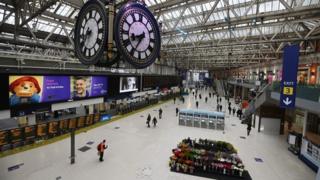Coronavirus: Commuters told to prepare to queue in new guidance

Image copyright
EPA
There were few passengers in Waterloo railway station during the morning rush hour earlier this week
Commuters who will be using public transport to return to work are being warned to be prepared to queue, in new guidance issued by the government.
With more workplaces opening up on Wednesday, people have been urged to avoid public transport if possible.
But for those who do have to use it, the guidance says: “Travel may take longer than normal on some routes.
“Plan ahead by identifying alternative routes and options in case of unexpected disruption.”
The government is asking people to consider cycling, walking or driving to work if possible.
“If you do travel, thinking carefully about the times, routes and ways you travel will mean we will all have more space to stay safe,” its guidance adds.
- How do I travel to work now?
Passengers should keep 2m (6ft) apart from others wherever possible and avoid the rush hour where feasible.
They are also advised to wash their hands before and after travelling, and to be considerate to fellow commuters.
The guidance adds that passengers should, if possible:
- Travel at off-peak times
- Book tickets online
- Take a less busy route
- Start or end your journey at a less busy station
Transport operators have been given guidance to ensure stations and services are regularly cleaned.
Transport Secretary Grant Shapps said: “We can all play our part by following the advice and reducing pressure on public transport.”
‘Mixed message’
However, rail unions have said they are worried about a rise in the number of people using the transport network.
At the start of May, before lockdown restrictions were slightly eased in England, the leaders of the Aslef, TSSA and the RMT unions sent a joint letter to Prime Minister Boris Johnson.
It said: “We have severe concerns over attempts by operators to increase service levels.
“It sends out a mixed message that it is OK to travel by train, despite official advice suggesting otherwise.
“We are not convinced that there is any basis at this time for a safe escalation of services.”

